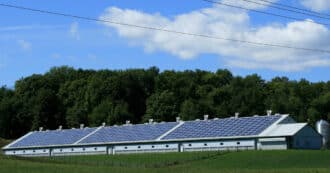By Ethel Mendius – When planning for the future of our species and planet, sustainability is the foremost aim. Economic sustainability in particular “refers to practices that support long-term economic growth” without negative social and environmental consequences.
Economic sustainability can be implemented locally and individually, but at its root it is a global goal. It is necessary we understand economic sustainability in order to develop holistically sustainable practices and achieve long-term well-being for human life on this Earth.
Sustainable Development
Development is one of the key issues addressed by the international community since the late 20th century. It is defined as “a process that creates growth, progress, [and] positive change.”
While development yields economic benefits, economist Amartya Sen writes that “economic growth cannot sensibly be treated as an end in itself. Development has to be more concerned with enhancing the lives we lead and the freedoms we enjoy.”
A closely related concept has come to prominence with the help of economists such as Jeffrey Sachs called sustainable development. Sustainable development is concerned with economic development that enhances the lives of both ourselves and future generations.
The most common definition of sustainable development is “development that meets the needs of the present without compromising the ability of future generations to meet their own needs.” In other words, it becomes a sustainable aspect of human existence.
Social, Environmental and Economic Sustainability
Sustainability can be understood through three closely related terms: environmental sustainability, economic sustainability and social sustainability, which are all necessary components that need to be taken into consideration for sustainable business practices.
Social sustainability, according to the United Nations Global Compact, is “about identifying and managing business impacts, both positive and negative, on people.” This includes fostering thriving communities and promoting equity for disadvantaged groups.
Environmental sustainability “means that we are living within the means of our natural resources” and ensuring the planet will be inhabitable for generations to come. Environmental sustainability is a major aim of the climate movement.
Economic sustainability accounts for social and environmental issues as it necessitates “we use, safeguard and sustain resources (human and material) to create long-term sustainable values.” Its ideal is an economic system that can be maintained and replicated without detriment to people or the planet.
Natural Resources and Sustainability
One area that demonstrates the interconnectedness of the three pillars of sustainability is the governance of natural resources. Even “[a] thriving economy that is built on exploiting other countries’ natural resources far away will lead to environmental degradation, pollution, and migration” eventually felt by the whole of the global population.
The management of natural resources, otherwise known as natural capital, is a major concern of economic sustainability. Economically sustainable practices avoid “growth that is accompanied by degradation or conversion of natural capital on which the poor depend for their livelihoods.”
Deforestation
One example of this is deforestation. Although cutting down forests is a quick source of timber and biofuel, it also sacrifices the resources of those who live in forests or rely on them for food, medicine, or fuel; particularly for those in developing countries, “deforestation means lost income, lost subsistence, and even a lost home.”
These issues will persist to harm locals, compromise land use, and hinder economic production indefinitely, outweighing the short term benefits of commodity production. These consequences must be considered when making decisions and ensuring a sustainable economy for future generations.
Agroforestry
An economically sustainable solution to conserving resources can be found in agroforestry, “a wide range of practices that integrate trees, forests, and agricultural production.” These practices allow for economic growth and agricultural production in forested areas while preventing the environmental impacts of all-out deforestation.
The Amazon Rainforest
The World Bank funds agroforestry projects in the Amazon rainforest in Acre, Brazil. These projects support an agroforestry system amounting to “the restoration of 11,000 hectares of abandoned pastureland” with robust biodiversity.
Valerie Hickey, a biodiversity specialist for the World Bank, argues “Agriculture can take advantage of degraded lands, while forestry is more than conservation and climate values. Forestry creates market opportunities and production activities for people.”
Underlina Cavalcante dos Santos, a pineapple farmer in Acre, explains that “Saving the forest is important to us because it also saves livelihoods. Sustaining the forest also sustains the urban areas and gives us better conditions for our families to live.”
Energy Consumption
Another element of economic sustainability involves the transition from fossil fuels to renewable energy sources. Fossil fuels are finite resources, the exhaustion of which will put economic strain on the communities that produce and consume them.
Economic Sustainability and Climate Change
In addition to its other risks, “climate change is one of the biggest threats to economic stability.” The natural disasters it causes leave many in abject poverty, and droughts pose a challenge to food security.
The global business community is a major culprit when it comes to pollution and carbon emissions. However, “measures aimed at dealing with global climate change are a golden opportunity for ensuring sustainable development and driving economic growth.”
Economists have now turned their attention to business models that support economic sustainability. By encouraging cleaner energy systems, improved land and water management, and “more circular and efficient use of materials” via recycling, the private sector could mitigate its environmental impact while promoting long term economic growth.
California Solar Initiative
Economic sustainability encourages a transition to renewable energy sources. For example, the California Solar Initiative is a state-run program “that gives low-income families the opportunity to add solar panels to their homes, with the goals of decreasing overall energy usage, helping families enjoy lower energy bills, and reducing the cost of solar energy.”
The program has achieved success and reached more than 1 million Californians. Similar initiatives worldwide could integrate energy consumption into the economic sustainability agenda.
Thinking Beyond Economic Growth
The reason these measures have not been achieved is that economic sustainability is at face-value incompatible with economic growth. Economic growth “does not limit the resource exploitation and energy, being mainly focused on productivity increase.”
The European Environmental Agency (EEA) reports that “loss of biodiversity, climate change, pollution and loss of natural capital is tightly coupled to economic activities and economic growth.” Therefore, it us incumbent upon business practices to look beyond growth in order to achieve economic sustainability.
While we have seen that sustainable practices can also be profitable, this overhaul is no small task, especially for businesses in competition with each other, the report finds. “Political initiatives for a sustainable future require not only technological change, but also changes in consumption and social practices,” amounting to a radical transformation of our economic systems.
According to the EEA, “The challenge is to innovate lifestyles that consume less but are attractive to individuals without an environmental, spiritual or ideological interest.” One could counterargue that the real challenge is to inspire an environmental, spiritual or ideological dedication to economic sustainability in the world’s population.
Economic Sustainability and the Global Economy
The era of globalization has raised the potential, and the stakes, for economic sustainability: “we have made the world far more capable of sustaining a large population, even in places with little environmental resources of their own,” and yet, we are chiefly using this system to exploit the natural and human resources of developing nations.
The United Nations’ Sustainable Development Goals promotes interwoven environmental, social, and economic sustainability initiatives. If met, these goals could bolster the global economy and ensure prosperity for all in the long term.
Strategies in reaching a more sustainable global economy include diversifying the economies of less developed countries and, more broadly, targeting inequalities that prevent long-term growth: “countries will have to urgently raise the living standards of the most deprived and address the inequality of opportunities in the long term” to make economic sustainability a global reality.
While economic sustainability can begin at the individual level, its need is truly felt at the level of international governance and the global business community and felt by the world population in total. It is necessary we recognize the problems in our present global economy so we may eat, shop, travel, and vote in ways that promote economic sustainability.
Economic Sustainability and Religion
Is religion just about focusing on the spiritual and not being distracted by the material? Well according to Rabbi Israel Salanter, “Someone else’s material needs are my spiritual responsibility.” Spirituality should not only exist in a cave, but should be found in helping others.
At the same time, spirituality ensures we’re not just seeking stuff for stuff’s sake. Religion can inspire us to live a life of balance by giving us a broader perspective. While a corporation is responsible to its current shareholders, religion make us responsible to God and future generations.
Spiritual Sustainability
It’s true, religion is often used as an excuse to just focus on the here and now. It’s ok to pollute, we may tell ourselves. God will take care of everything. Or, we’re headed towards apocalypse anyways, might as well enjoy this moment. This is not pious thinking.
Pious thinking for a religious person must recognize that God gave us this planet to “conserve and protect it” (Genesis 1). In the words of Gautama Buddha, “As the bee collects nectar and departs without injuring the flower, or its color or fragrance, so let the sage dwell on earth.” And as we learn from The Quran “Don’t seek to cause corruption in the Earth” (Surah Al Qasas: 77).
In almost every religion there are traditions about protecting the planet. We must live in balance with Earth and our fellow humans, preventing the greed of the moment from destroying the resources of the future.
May God help us to live in balance, so that each person can have what they need, both physically and spiritually.
* Featured image source








